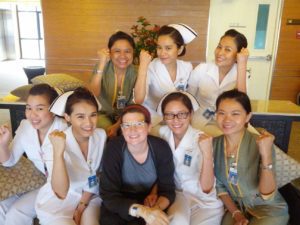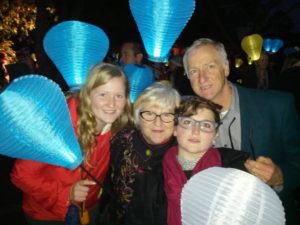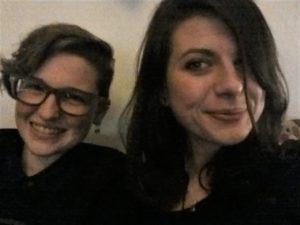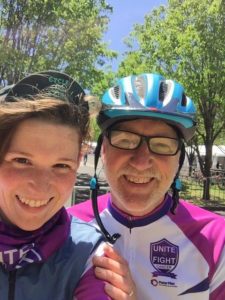Survivor Eleanor proving a gift in Will is ageless
Before undergoing her life-saving transplant at just 23-years-old, Eleanor made a lasting commitment to the blood cancer community through her gift in Will.

Eleanor was diagnosed with an aggressive leukaemia in September 2012 while travelling through South East Asia.
“I was travelling through Nepal and thought I had food poisoning,” said the now 30-year-old.
“After a week of sickness, I went to a travel clinic and the first question they asked me was if I had travel insurance – luckily, I did.
“They did a blood test thinking it was typhoid but instead picked up that I had no white blood cell count.
“My first thought was ‘my blood is red why would I need any white cells?’”
Eleanor was medically transferred to a hospital in Thailand and after a week she was diagnosed with leukaemia.

“I spent 10 days in Thailand and all I ever saw was the hospital,” said Eleanor.
“My leukaemia was actually found cellularly and hadn’t even spread beyond the bone marrow when I was diagnosed so it was very early days.
“I don’t believe it would’ve been picked up if I was back home in my normal environment, just working and going to uni.”
Eleanor and her mother, who had flown to Thailand, returned immediately to Melbourne.
“The Thai hospital sent all my documentation and it was confirmed that I had acute myeloid leukaemia (AML),” remembered Eleanor.
“I started treatment on the 20th September 2012 with my first round of induction chemotherapy.
“It was at the hospital that I first met the Leukaemia Foundation staff who offered up a range of services.
“It was great to be connected with that blood cancer community and my family accessed practical support in the way of petrol and shopping vouchers which was really helpful.”
After her second round of chemotherapy it was confirmed that Eleanor had a gene mutation on her leukaemia cells called FLT3 and she would need a transplant.
Between 20 and 30 percent of people with AML have this mutation. The FLT3 gene codes for a protein called FLT3 that helps white blood cells grow. A mutation in this gene encourages the growth of too many abnormal leukemia cells.
“Essentially, my bone marrow didn’t do anything wrong,” explained Eleanor. “It’s just programmed to create cancerous cells, so it was a bit of bad luck.
“I was told 50% of people don’t survive the first 30 days after transplant but I 100% wouldn’t have survived without it – I figured I was doubling my chances.”
Before her transplant Eleanor hosted a ‘transplant party’ with friends and family.
“I signed my Will at that party, one of my aunts worked in legal assistance and had brought the document over,” said Eleanor.
“It was highly recommended to have a Will prior to the transplant.
“It’s very practical thing to do and I’m a very practical person.”
“I think my mother suggested leaving a gift to the Leukaemia Foundation and that seemed very natural to me.

“I very much liked the idea of supporting a blood cancer charity and if I didn’t make it, hopefully my gift would mean someone else would.
“The process wasn’t onerous; both my parents have wills and knew people who could sort it out for me.”
Eleanor is aware that she is not what many people a consider a typical gift in Will supporter, but she would encourage more younger people like herself to consider the option.
“I think it’s quite intimidating for younger people as it’s often pitched as this scary legal thing with unfamiliar language,” she said.
“I’d encourage people to just have the conversation, to get the trusted information and a checklist together which is available through the Leukaemia Foundation.
“A number of my friends have now got their Wills in order because of what I have gone through, but it shouldn’t have to come to that.”
Eleanor received her bone marrow transplant from a German unrelated matched donor in February 2013.
“After the required two years we were able to connect and have since met up twice which was really nice,” said Eleanor.
“There was never any doubt in my mind that we would meet, and I actually started learning German.”
While the transplant was tough, Eleanor bounced back quickly returning gradually to everyday life with a few lasting side-effects.
“I’ve had a bit of graft-versus-host-disease (GVHD),’ explained Eleanor. ‘This presents as tendonitis in the hips so sometimes walking can be difficult. I also get bad nausea and need to keep an eye on my low platelets.
“The first two years it was every day but now it’s maybe once or twice a week so very manageable.
“I still have annual check-ups and can easily contact my medical team if I ever need to.”
After her transplant, Eleanor resumed university and obtained a postgraduate degree, in Information Management.
She is now working as a tertiary librarian in New South Wales.

“I really love my profession and feel very proud that after everything I have been able to re-enter society and regain my independence.”
Eleanor feels contented that her wishes have been made clear through her Will and that the Leukaemia Foundation will be able to support people living with blood cancer well into the future.
“I haven’t stipulated in my Will that the funds should be used for anything specific but just leave it up to the Leukaemia Foundation to disperse as needed,” said Eleanor.
“What organisations actually need is continuous ongoing support not just a one-off dump of money.”
Eleanor and her parents have participated in supporter seminars, receiving information and updates about the impact of their support from Leukaemia Foundation staff and leading researchers.
“As my work is research adjacent, I have a real interest in how the Leukaemia Foundation manages priorities there,” said Eleanor.
“The sessions were really informative, and it feels good to have that active engagement with an organisation which you know first-hand can make a real difference in people’s lives.”
Eleanor is now firmly focused on the future, enjoying her ‘dream job’ while continuing to manage the long-term effects of her treatment.
“I feel very lucky to have the opportunity to do something I love every day and know that is down to the many wonderful medical staff, researchers and organisations like the Leukaemia Foundation who supported me through my blood cancer experience,” said Eleanor.
“I am really proud that my gift will allow that same sort of support to continue well into the future.”
Leaving a Gift in Will
To learn more about leaving a gift in your Will, please contact our Gift in Wills Manager, Emma Dwyer, on 08 8169 6051 or email [email protected].
Please seek professional legal advice before making or amending your Will.
Last updated on November 16th, 2023
Developed by the Leukaemia Foundation in consultation with people living with a blood cancer, Leukaemia Foundation support staff, haematology nursing staff and/or Australian clinical haematologists. This content is provided for information purposes only and we urge you to always seek advice from a registered health care professional for diagnosis, treatment and answers to your medical questions, including the suitability of a particular therapy, service, product or treatment in your circumstances. The Leukaemia Foundation shall not bear any liability for any person relying on the materials contained on this website.